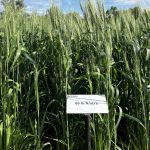
Tag Archives nitrogen fertilizer

How much nitrogen can farmers really cut?
Manitoba fertilizer trials search for the sweet spot where farmers can cut nitrogen rates, with a nitrification inhibitor, without harm to yield

Ramp up your nitrogen efficiency in winter cereals
Nitrogen ramps are a tool to help farmers hone fertilizer rates for the best, most efficient winter cereal crop

Green Lightning and Nytro Ag win sustainability innovation award
Recipient says accepting award was a humbling experience

FEED ME: Can well-fed plants fend off diseases and insects?
We examine an Idaho farmer’s program for crop self-defence

The role of enhanced efficiency fertilizers in nitrogen fertilization
Crop Nutrition: Maximum crop production cannot be achieved with fertilizers and amendments alone

Rethinking nitrogen efficiency
Tracking nitrogen with stable isotopes offers surprising insights into fertilizer uptake, loss, and management strategies

Maximize your nitrogen efficiency with the right practices
Strategic application can reduce N losses and boost productivity

Nitrogen, nitrates and nitrites
Know the names and natures of the nutritious and noxious

Cutting N on oats can pay off, if it’s drier
Potential gain in net revenue must be weighed against opportunity cost

Digging into the cause of poor yields
Did drought, fertility issues or something else lead to that poor crop? We look at the possibilities


